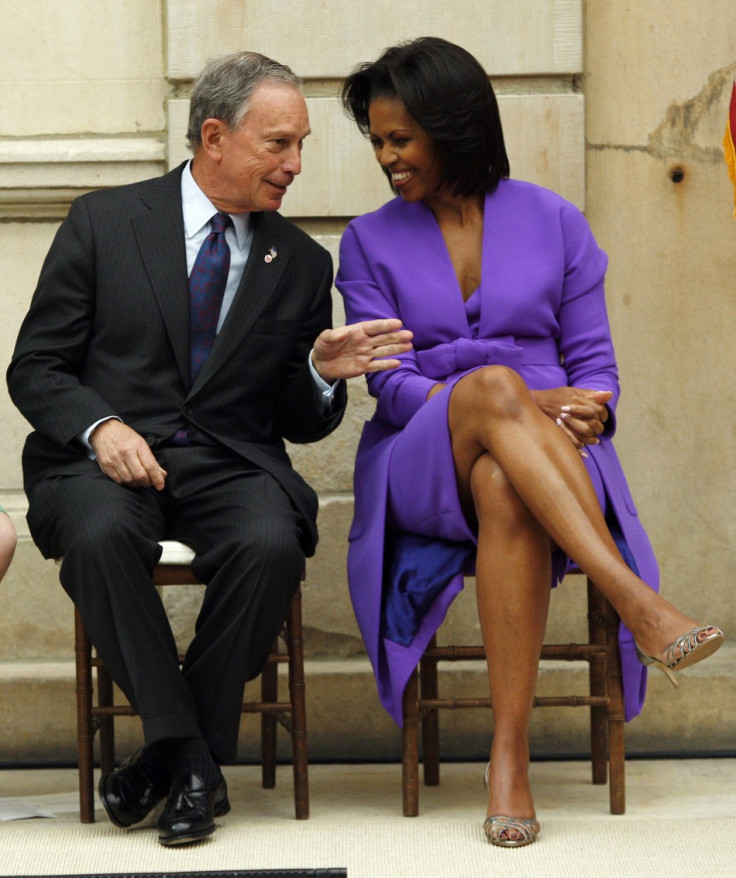The Bloomberg Way? Mayor Mike Could be President Obama’s Next Treasury Secretary

"Fine, but how do we pay for it?"
The brutal, bottom-line retort to any policy suggestion in Washington underlines the importance of perhaps the Beltway's most influential - but often overlooked - insider : Secretary of the Treasury.
One more bruising encounter with feuding House Republicans and Senate Democrats over the $17 trillion debt ceiling awaits the current keeper of the nation's purse next month, Secretary Timothy Geithner, but after four of easily the most challenging years of any member of President Barack Obama's Cabinet, he's widely expected to throw in the abacus.
Assuming he can help cut a deal.
Either way, the President is going to need a new chief financial officer at some point in the very near future and there's more than enough evidence to suggest he might have already found his man: New York Mayor and media visionary Michael Bloomberg.
Isn't he a Republican, you might ask?
Well, we was, but he's been an Independent since 2009 and the idea of a "Cabinet of rivals", first espoused by President Abraham Lincoln, has always intrigued the President.
And given the bare-knuckle nature of both the previous debt-ceiling and budget negotiations between his party and the GOP, he might feel even more fondness for the idea of "keeping my enemies closer" - especially given the narrow popular mandate of his recent election victory.
A victory which, of course, was surprisingly endorsed by none other than Michael Bloomberg himself as the Mayor picked through the wreckage of Superstorm Sandy, which "brought the stakes of (the election) into sharp relief" according to his emotional editorial in Bloomberg View.
I use that word intentionally, because the uber-technocratic problem-solver is not a man given to exploring his inner softness (he famously tried to sack - on the spot - a city employee when we saw him playing solitaire on his office computer) and had vowed not to endorse either candidate just a few weeks earlier.
So what changed his mind?
And why are we reading media reports - directly denied - of a major deal between his eponymous media giant (he hates that word) and data provider with the Financial Times?
A columnist looking to connect the dots would say that the best way to clear a path from Gracie Mansion to Capitol Hill would be to finally cash-out of your $88 percent holding in the privately-held Bloomberg LP that most analysts have insisted will never be sold or merged until you do.
Let's face it: New Yorkers might be cool with the "blind trust" the manages Bloomberg's stake in Bloomberg, but there's simply no possible way the President would let you sign your name to the dollar bill (the coolest perk of the office) while you're still connected to a media group.
Oh, and his third-mayoral term expires next year.
Could the timing of the moves be coincidental, or political?
The former is possible, the latter seems at least plausible: Bloomberg is eminently suited to the USA Inc CFO role. He worked on Wall Street when it wasn't tainted and knows the markets inside and out. He built a multi-billion dollar company - literally - from the keyboard up, using his own cash, sweat equity and obstinance. He created a version of the internet at least 15 years before anyone ever heard of the word. He convinced the most loyal Democratic voters in America to trust his leadership as Mayor.Three different times.
He's smart, principled, respected and fearless. And he's not in it for the money (he's worth $25bn).
He's also autocratic, incapable of delegation, unaccustomed to taking orders from anyone and given to absurd fits of micro-management (down to the level of legislating the size of fizzy drinks in restaurants).
But that might not matter.
The President knows him well and has had a good deal of experience managing a superstar Cabinet colleague with an outsized personality and a colourful history.
Her name is Hilary Clinton.
Secretary Geithner's hard graft next month will make his successor's job a tiny bit easier, but the US is heading into its most fiscally difficult era in history as it staggers under a Killamajaro-sized debt mountain and an unprecedented challenge to the reserve currency status which keeps the cost of that burden on the right side of manageable.
Brokered compromises on entitlements, budgets, spending and borrowing have gone from "wish-list" to "must-have" if the US is going to retain any sort of economic edge over the super-surging Brics or moral authority over the profligate Europeans.
It's a titanic challenge. But he's done it before, turning a $6bn deficit in one of the most byzantine municipal democracies this side of Beijing into a tidy surplus via - wait for it - property tax increases and agency spending cuts.
He'd be good.
Hire that man, Mr. President.
© Copyright IBTimes 2025. All rights reserved.





















